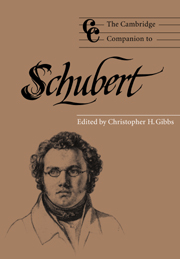Book contents
- Frontmatter
- Introduction: the elusive schubert
- Part I Contexts: musical, political, and cultural
- Part II Schuberts music: style and genre
- Part III Reception
- 13 German reception: Schubert's “journey to immortality”
- 14 Schubert's reception history in nineteenth-century England
- 15 Schubert's reception in France: a chronology (1828–1928)
- 16 Franz Schubert's music in performance: a brief history of people, events, and issues
- Notes
- Index
14 - Schubert's reception history in nineteenth-century England
from Part III - Reception
Published online by Cambridge University Press: 28 September 2011
- Frontmatter
- Introduction: the elusive schubert
- Part I Contexts: musical, political, and cultural
- Part II Schuberts music: style and genre
- Part III Reception
- 13 German reception: Schubert's “journey to immortality”
- 14 Schubert's reception history in nineteenth-century England
- 15 Schubert's reception in France: a chronology (1828–1928)
- 16 Franz Schubert's music in performance: a brief history of people, events, and issues
- Notes
- Index
Summary
The songs
During his lifetime Schubert was known almost solely as a composer of Hausmusik – songs, dances, marches, and other characteristic pieces for the piano. So much is clear from the fact that of the 478 compositions published before his death (SDB 946), 209 were solo songs or partsongs with piano accompaniment, and 249 were keyboard pieces. It was as a song composer that he first made his name in Vienna, and inevitably when his name first began to be heard abroad it was for his songs. In London the pioneer was a German from Bremen called Christian Wessell, who came to London in the 1820s and founded the publishing firm of Stodart and Wessell.
The sequence of events as reflected in the Harmonicon, a musical monthly which managed to survive for eleven years (1822–32), was as follows. In December 1830 the London firm of Johanning and What more published a Christmas and New Year annual which included as one of its items Schubert's F Minor Moment musical (D780, 3) under its original published title of Air Russe. The annual, called the Cadeau, also appeared a year later, and this time included Schubert's Erlkönig (D328), using Sir Walter Scott's translation of the text. In the summer of 1832 the famous dramatic soprano Wilhelmine Schröder-Devrient came to London to take the prima donna role in the first London production of Beethoven's Fidelio, and took the opportunity to introduce Erlkönigto a London audience, whereupon Wessell and Stodart decided to publish the song with Scott's words “as sung by Madame Schröder-Devrient.”
- Type
- Chapter
- Information
- The Cambridge Companion to Schubert , pp. 254 - 262Publisher: Cambridge University PressPrint publication year: 1997

